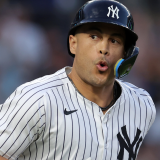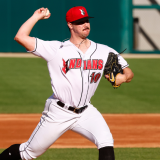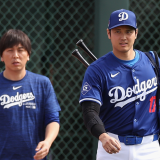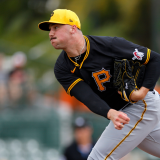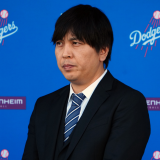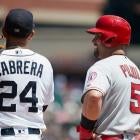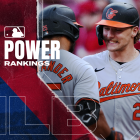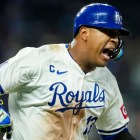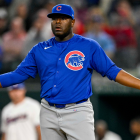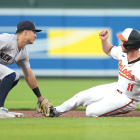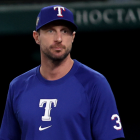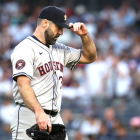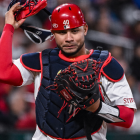Mike Trout is going to end up in the Hall of Fame some day. He's the best player in baseball, and has been basically since the moment he stepped onto a field, and despite just turning 28 last August, he's already nearly in the top 50 in career WAR for hitters — ahead of 2020 Hall inductees Larry Walker and Derek Jeter.
It doesn't take a lot of imagination to see Trout in Cooperstown, and he's not alone — Albert Pujols and Miguel Cabrera will get there first, Clayton Kershaw, Max Scherzer, and Justin Verlander should all join them there eventually. I surveyed CBS Sports' baseball staff and the Fantasy Baseball Today podcast this week to see which active players would one day wind up in the Hall of Fame, and those six stood above the pack as the unanimous consensus choices, and there's some nice symmetry to it; three hitters, three pitchers, the best of their generations.
After those six is where the debates start. I had each voter – 11 in total — put together a ballot of up to 15 active players they think will make the Hall of Fame among all active players. Twenty-nine total players received votes, with 11 crossing the 75% threshold the Baseball Hall of Fame uses for enshrinement and 13 receiving votes from at least half of the ballots.
Of those receiving votes on 75% of ballots, Trout is one of just two under the age of 30 to make it, and that makes sense. There's a lot that can go wrong for even the best players on the way to the Hall, so the more pages of a player's career story are left to write, the harder it is to guarantee they'll get there. In the end, more than 11 currently active players will end up making it, but some will be ones we don't necessarily see coming, while some of the seemingly obvious choices today will end up falling short.
From the MLB team, Matt Snyder, Dayn Perry, R.J. Anderson, Katherine Acquavella, and Stephen Pianovich sent in ballots, as did CBSSports.com Managing Editor Adi Joseph; CBS Fantasy's Heath Cummings, Adam Aizer, Scott White, Frank Stampfl, and myself also took part. We broke down some of the picks on Tuesday's episode of the Fantasy Baseball Today podcast, which you can listen to here:
And here are the full results of who made the cut:
Player | Votes | Percent |
Albert Pujols | 11 | 100.0% |
Miguel Cabrera | 11 | 100.0% |
Mike Trout | 11 | 100.0% |
Clayton Kershaw | 11 | 100.0% |
Justin Verlander | 11 | 100.0% |
Max Scherzer | 11 | 100.0% |
9 | 81.8% | |
9 | 81.8% | |
9 | 81.8% | |
9 | 81.8% | |
9 | 81.8% |
The six unanimous selections represent the top three hitters in active bWAR, plus Nos. 1, 3, and 5 at starting pitcher. Greinke, the No. 2 pitcher in career WAR also got in, and with a 2.93 ERA last season and 2.95 ERA in the ALCS and World Series at 35, it doesn't like he's all that close to slowing down. Greinke might feel like more of a lock if he had won that razor-thin 2015 NL Cy Young race, but as one of just six pitchers in MLB history with two seasons with an ERA+ greater than 200, he seems like a pretty safe bet to get there before long.
Betts is probably the consensus second-best player in baseball, and, in a Trout-less universe, he would have had two MVPs to his name heading into what will likely be the most lucrative free agency ever, so it's no surprise our crew has faith in him making it. Betts already has the 15th-most WAR for any right fielder over a seven-season stretch in MLB history, and he's only played five full seasons. We're watching something special with Betts, and the Dodgers are certainly hoping he keeps it up in 2020 and beyond.
I was surprised to see Votto get this much support, but we are a more analytically inclined group than the Hall voters as a whole, so I suspect he'll have a bit more trouble eventually. There's no question Votto's peak is Hall-worthy — even after two down seasons, he's 27th in career OPS and is one of just 23 members of the .300/.400/.500 lifetime club. However, his counting stats hold him back, as he sits at just 1,866 hits and 284 career home runs. Votto probably needs to bounce back and play at an All-Star level to lock up his candidacy.
Posey and Molina may seem somewhat surprising, but they defined the catcher position for this generation, winning five World Series between them. Posey is the clearly superior hitter, with an MVP under his belt to boot, but Molina is an all-time great with the glove who has had remarkable longevity — the peak isn't quite as impressive, but he's caught at least 110 games in a remarkable 15 straight seasons.
There was a gap between those 11 and the next group of players, with Robinson Cano and Juan Soto both getting six votes, the only other two above 50%:
Player | Votes | Percent |
Juan Soto | 6 | 54.5% |
Robinson Cano | 6 | 54.5% |
In Cano's case, he'd probably be pretty close to unanimous if not for that PED suspension in 2018, but that's going to linger over his case for a long time. The question is whether enough time will have passed by the time he is eligible for the heat to have died down. On the merits, Cano looks plenty deserving, with 2,570 hits and the second-most home runs for a second baseman ever, and he'll add to those totals with three years left on his contract, giving him a shot at 3,000 hits. He likely won't be on the ballot until 2028, which means a full decade will have passed since his suspension. Will that be enough time for the the voting body to approve of Cano?
On the other end of the career spectrum, Soto is a bold call as a 21-year-old, but he's certainly on the right track. In fact, just playing at much as he has at his age gives Soto a pretty good chance; since the league integrated in 1947, only 10 players have at least 1,000 plate appearances before their age-21 season, and four of them are in the Hall. Two (Soto and Bryce Harper) are active, while Tony Conifliaro could have had a Hall of Fame career if injuries hadn't derailed him. That's pretty much the only way things could go wrong for Soto, who trails only Mel Ott in home runs before turning 21.
The rest of the results look like this:
Player | Votes | Percent |
Ronald Acuna | 4 | 36.4% |
4 | 36.4% | |
4 | 36.4% | |
4 | 36.4% | |
2 | 18.2% | |
2 | 18.2% | |
2 | 18.2% | |
2 | 18.2% | |
2 | 18.2% | |
2 | 18.2% | |
1 | 9.1% | |
Bryce Harper | 1 | 9.1% |
1 | 9.1% | |
1 | 9.1% | |
1 | 9.1% | |
1 | 9.1% |
Acuna isn't quite as precocious as Soto, and he isn't quite as good a hitter, but the all-around game gives him a fair claim to the "next Mike Trout" throne. He has one top-five finish in MVP voting already, and it won't be his last.
Lindor and Arenado have written more of their career stories than Soto or Acuna have, but they've both still got plenty left. Both are elite defenders at key positions who have been among the best in the game for the last half-decade, and another half-decade of something similar from both should get them there.
Kimbrel's chances are going to come down to how opinions about closers change as the voting bloc shifts. Kimbrel has been the best reliever in baseball over the last decade, and has all-time great strikeout and run-prevention marks, but Billy Wagner was similarly dominant for 900 innings and hasn't really gained much traction from voters. Kimbrel needs at least a few seasons with big save totals to climb the all-time list, and these votes are a bet that last season's struggles were more due to his delayed signing and the knee injury than anything else.
Among those receiving multiple votes, Yelich and Altuve seem like the best bets as position players under the age of 30, though Altuve will have to overcome the stigma from the Astros' sign-stealing scandal. If not for that, I think he'd be right there with Betts and Trout. Yelich's later breakout means his career numbers are a bit behind where you'd want them to be, though if he remains an MVP-caliber player for the next five years, he'll get there. There's work to do.
And Bumgarner could benefit from the narrative that propelled Jack Morris to the Hall, thanks to his postseason exploits, though it's also worth saying Bumgarner was a significant better pitcher overall. We'll see how he fares outside of Oracle Park, because he was showing significant signs of decline before leaving the Giants, but he's another player who could see his odds of making it to Cooperstown rise dramatically with a few more good years








